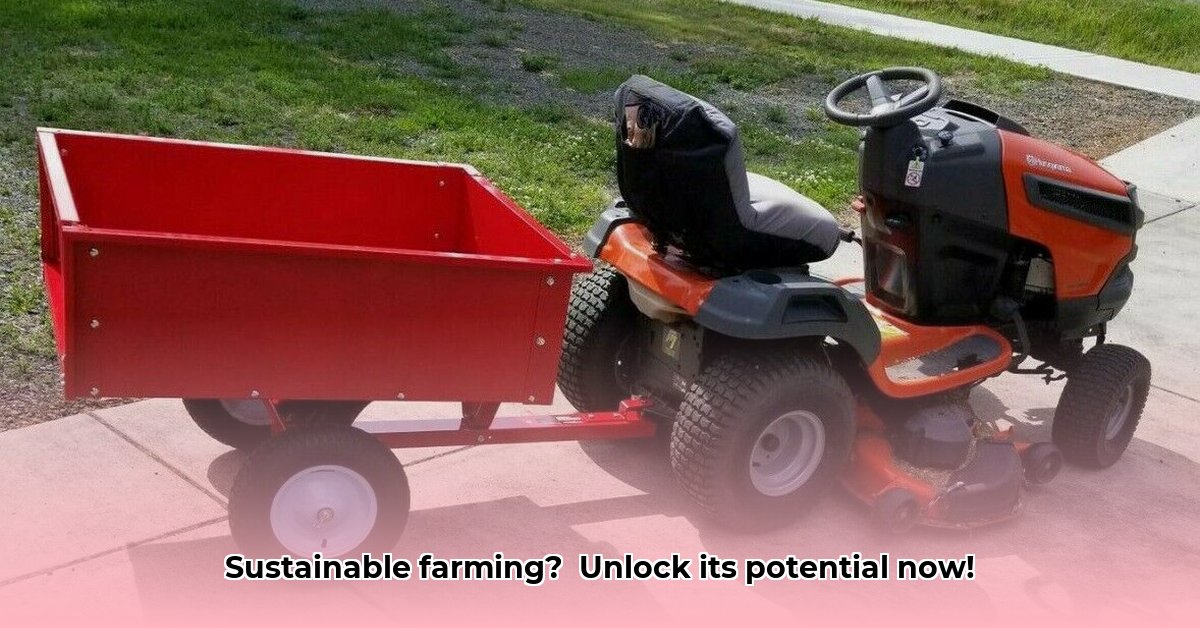
Tractor Lawn Mower Trailers: Sustainable Farming's Unexpected Ally
Forget expensive farm equipment! Riding lawn mower trailers offer a surprisingly effective and affordable solution for small-scale, sustainable farming. These often-overlooked tools provide a budget-friendly, easy-to-use, and fuel-efficient way to transport harvested crops, tools, and supplies around your property. For example, consider the power of a John Deere 110 paired with the right trailer. While they have limitations in payload and terrain capability, their advantages make them a compelling option for many small farms looking to minimize costs and environmental impact. This article explores the practical applications, safety considerations, and long-term implications of using riding lawn mower trailers in sustainable agriculture.
Small-Scale Farming's Secret Weapon: The Riding Lawn Mower Trailer
The humble riding lawn mower trailer may not be the first image that comes to mind when envisioning modern sustainable farming practices. However, for smaller operations, these often-underutilized trailers offer significant advantages. Their affordability, ease of use, and fuel efficiency are particularly attractive to farmers working with limited resources. But what exactly can they do, and are they right for your farm?
Advantages of Using a Riding Lawn Mower Trailer in Sustainable Farming
- Budget-Friendly: Significantly cheaper than larger agricultural trailers, making them accessible to farmers with limited budgets.
- User-Friendly: Simple to operate, requiring minimal training and reducing labor costs.
- Fuel-Efficient: Lower fuel consumption compared to larger vehicles, contributing to a smaller carbon footprint. This is especially true when used with electric riding lawn mowers.
- Versatile: Can transport a range of items, from harvested produce to tools and supplies.
Disadvantages of Using a Riding Lawn Mower Trailer in Sustainable Farming
- Limited Payload Capacity: Not suitable for extremely heavy loads or large-scale harvests.
- Terrain Restrictions: Best suited for relatively smooth surfaces; unsuitable for rough or uneven terrain.
- Size Constraints: Limited carrying capacity may necessitate multiple trips for larger loads.
Should you consider using a riding lawn mower trailer? The answer lies in carefully assessing your unique needs. Let's explore how to do just that.
Making the Most of Your Riding Lawn Mower Trailer: A Practical Guide
This section provides a step-by-step guide to effectively utilizing a riding lawn mower trailer for your farm.
1. Assessing Your Transportation Needs
Before purchasing a trailer, meticulously evaluate your transportation requirements. This involves:
- Inventorying Your Loads: List all items regularly transported, noting their weight and dimensions.
- Measuring Distances: Determine the typical distances involved in transporting these items.
- Estimating Weights and Volumes: This crucial step ensures you select a trailer with adequate capacity.
This detailed assessment will prevent purchasing an unsuitable or oversized trailer.
2. Choosing the Right Riding Lawn Mower Trailer
Selecting the right trailer involves key considerations:
- Sizing: Choose a trailer compatible with your loads and your lawn tractor's towing capacity. Overloading is dangerous and reduces efficiency.
- Materials: Steel trailers offer durability but are heavier; aluminum trailers are lighter but can be more susceptible to damage.
- Essential Features: Ramps for easier loading/unloading and reliable safety chains are highly recommended.
Remember, a poorly chosen trailer can negate all the potential benefits.
3. Safe Towing Techniques: Prioritizing Safety
Safe towing practices are paramount. Follow these steps:
- Even Weight Distribution: Distribute the load evenly to prevent tipping.
- Adhere to Manufacturer Guidelines: Always consult and follow the manufacturer's recommendations.
- Road Safety: Ensure appropriate lighting and signaling when using the trailer on public roads.
Neglecting safety measures can lead to accidents and damage.
4. Maintaining Your Trailer: Extending its Lifespan
Regular maintenance extends the trailer's useful life.
- Regular Inspections: Frequently inspect for damage, loose bolts, or other issues.
- Preventative Maintenance: Lubricate moving parts, clean and inspect tires, and replace worn parts promptly.
- Troubleshooting: Learn basic troubleshooting or when to seek professional help.
Proactive maintenance prevents costly repairs and downtime. Think of it as an investment in your farm’s productivity.
Environmental Considerations and Long-Term Sustainability
Using a riding lawn mower trailer, particularly with an electric mower, significantly reduces fuel consumption and carbon emissions compared to larger vehicles. This aligns perfectly with sustainable agriculture's principles. But the environmental benefits extend beyond just fuel efficiency.
Exploring shared ownership models among farmers can reduce the initial investment cost for each individual. Furthermore, the future could see the development of specialized agricultural trailers optimized for use with riding lawn tractors. Agricultural extension services can play a crucial role in promoting best practices and conducting research to compare the environmental impact of riding lawn mower trailers with alternative transportation methods.
Conclusion: Embracing the Potential
Riding lawn mower trailers offer a surprising and effective solution for small-scale, sustainable farming. While limited in capacity and terrain capabilities, their affordability, simplicity, and fuel efficiency make them a valuable asset for many small farms. By carefully assessing your specific needs and implementing safe operating practices, you can unlock the considerable potential of this often-overlooked tool to enhance your farm’s efficiency and sustainability. The future holds even more potential with collaborative efforts and the development of specialized agricultural trailers.